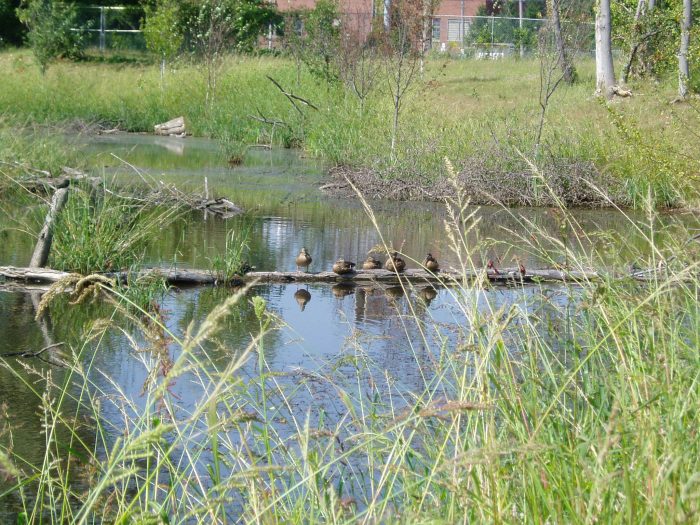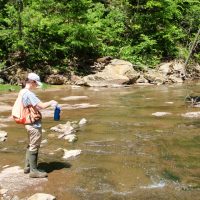By EnviroScience Senior Ecologist Michael Liptak, Ph.D.
On August 29, 2023, the U.S. Army Corps of Engineers (USACE) released a prepublication version of its revisions to the definition of Waters of the U.S. (WOTUS), which were completed to comply with the U.S. Supreme Court’s decision in its May 25, 2023 ruling (Sackett v. EPA).
The Court held that the wetlands are not inherently WOTUS, and the only wetlands under federal jurisdiction are those with a continuous surface connection with a recognized WOTUS (such as a lake, stream, or river) where it is impossible to distinguish where the federally regulated water body ends and where the wetland begins. The USACE completed this revision, which will take effect immediately upon publication in the Federal Register, under the good cause exemption, which does not require a public notice or public comment period to revise the existing rule.
The following changes were made:
- The significant nexus test is no longer an acceptable method by which to determine if a wetland is regulated under federal law and is removed from the text and definitions.
- The definition of “adjacent” was revised to mean “having a continuous surface water connection” from its previous definition of “bordering, contiguous, or neighboring.” Natural or man-made separations between wetlands and streams or lakes (such as dunes or berms) provide sufficient separation to remove wetlands from regulation under the Clean Water Act.
- Interstate wetlands are removed from the definition of WOTUS.
No changes were made to other definitions or exclusions.

What does this mean? Simply stated, wetlands that are not directly connected to a regulated stream, river, lake, or pond by a continuous surface water connection are not regulated under the Clean Water Act. Those wetlands are regulated under applicable state and local regulations.
Are wetlands no longer wetlands? The federal definition of wetlands and streams remains the same. The USACE still determines wetland boundaries and makes the determination of whether they are regulated under the Clean Water Act or not.
Is this decision retroactive? No. Existing permits and jurisdictional determinations are still valid. If you wish to obtain a new jurisdictional determination from the USACE, they will do so, but it will take several months.
Do I still need a wetland delineation on my property if I want to develop? Yes.
Does this affect farmers? No. The basis for the regulation of farmed wetlands is the Food Security Act, which was not addressed in the recent Supreme Court case.
OHIO
State Wetland Regulation Continues as Before in Ohio
All wetlands are considered waters of the state in Ohio, and any waters that are not under federal jurisdiction have been regulated under the Ohio Isolated Wetland Law since 2001.
NORTH CAROLINA
State Legislature Overrides Governor’s Veto of Farm Act, Removing Wetland Protection from 2.5 Million Acres in North Carolina
Governor Cooper vetoed Senate Bill 582 on June 23, 2023, because it would strip legal protections from half the state’s wetlands.
The removal of these protections would mean “more severe flooding for homes, roads and businesses, and dirtier water for our people, especially in eastern North Carolina,” his veto message read. “The General Assembly has allocated tens of millions of dollars to protect the state from flooding, and my administration is working to stop pollution, like PFAS and other contaminants. This bill reverses our progress and leaves the state vulnerable without vital flood mitigation and water purification tools.”
Roughly 2.5 million acres of wetlands composing 7% of North Carolina’s land mass could lose environmental protection, the fallout of a one-two punch by state lawmakers and the U.S. Supreme Court.
The House overrode Governor Cooper’s June 23, 2023, veto of the Farm Act on June 27, 2023, stripping 2.5 million acres of wetlands — an area one and half times larger than the state of Delaware — of environmental protection. The vote was 78-40 in favor of the override. The Senate overrode the governor’s veto Monday by a 29-17 margin, with the votes landing along party lines.
The Farm Bill states: SECTION 15.(c) Implementation. – Wetlands classified as waters of the State are restricted to waters of the United States as defined by 33 C.F.R. § 328.3 and 40 C.F.R. § 230.3. Wetlands do not include prior converted cropland as defined in the National Food Security Act Manual, Fifth Edition, which is hereby incorporated by reference, not including subsequent amendments and editions.
EnviroScience experts are on top of these rules and will continue to regularly post updates to regulatory guidelines.
Few environmental firms in the country retain EnviroScience’s degree of scientific know-how, talent, and capability under one roof. The diverse backgrounds of our biologists, environmental engineers, scientists, and divers enable us to provide comprehensive in-house services and an integrated approach to solving environmental challenges—saving clients time, reducing costs, and ensuring high-quality results.
Our client guarantee is to provide “Excellence in Any Environment,” meaning no matter what we do, we will deliver on our Core Values of respect, client advocacy, quality work, accountability, teamwork, and safety. EnviroScience was created with the concept that we could solve complex problems by empowering great people. This concept still holds true today as our scientists explore the latest environmental legislation and regulations and incorporate the most up-to-date technology to gather and report data.
EnviroScience expertise includes but is not limited to aquatic surveys (including macroinvertebrate surveys and biological assessments); ecological restoration; ecological services (including impact assessments, invasive species control, and water quality monitoring); emergency response; engineering and compliance services; endangered mussel surveys; laboratory and analysis; stormwater management; threatened and endangered species; and wetlands and streams (including delineation and mitigation). Further, EnviroScience is one of the few biological firms in the country that is a general member of the Association of Diving Contractors International (ADCI) and offers full-service commercial diving services.



